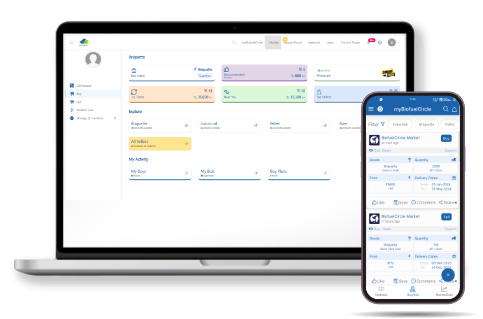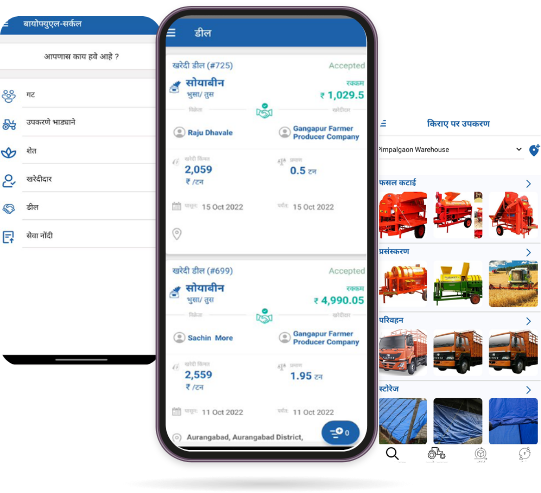BiofuelCircle has set up a Digital platform for Bioenergy Supply Chain. The platform has helped set up a unique farm-to-fuel ecosystem that connects farmers, rural enterprises, biomass processors, to industries wanting to replace fossil fuels with sustainable biofuels. BiofuelCircle aims to be a catalyst for India’s energy transition roadmap.
We are pioneering a world of enhanced and digitally-driven bioenergy supply chain in India. We not only seek to address all the challenges of bioenergy supply chain but also make a positive impact on the economy, community, and the environment around us.
BiofuelCircle is helping businesses grow by creating new opportunities in farm-to-fuel ecosystem, while enabling a circular economy for agro-waste, rural empowerment and reducing carbon footprint.
Vision
Empowering Green Economy through a reliable, end-to-end supply chain for Biomass, Biofuels, and other Bio-Products.


Goals
- Ease of market access and reach for Biomass and Biofuel businesses.
- Efficient and Reliable Logistics for Biomass, Biofuels and Bio-products.
- Ease of financing and Digital settlements for platform participants
Our Purpose
BiofuelCircle Private Limited, based in Pune, India, founded in June 2020, is registered as a start-up with the Start-up-India program. The driving force behind the creation of BiofuelCircle was a strong will and need to build a reliable and cost-effective bioenergy supply chain.

Around 235 million tons of agricultural residue goes waste every year in India.
This residue has the potential to meet 17% of India’s energy needs but more than 70% of this gets burnt or wasted due to a combination of reasons.
Fragmented Rural Sources:
Small and spread-out land holding makes aggregation difficult.
Low Economic Incentives:
Very low economic incentive for rural participants to avoid crop burning.
Seasonal Availability:
High cost of storage Market Access: Inability of rural suppliers to have direct access to industrial buyers.
We want to create a viable model for utilizing this opportunity using digital technology. BiofuelCircle platform provides an end-to-end support for biomass, biofuels, and bio-products. It solves the problem of reach and logistics.
It helps create a reliable supply chain for bioenergy; coupled with dynamic market-based participation.

The Company
BiofuelCircle Pvt Ltd, was founded in June 2020. The company’s founding team brings together a rich mix of domain and leadership experience. Supported by early-stage venture investors, the company is on its way to create a stronger impact in Biomass driven energy transition.
With operations in 5 Indian States, the company has connected > 1,000 businesses with 20,000 farmers. With annual biomass volume of a quarter million MT, BiofuelCircle transacts > Rs 200 crore annually on the platform.
BiofuelCircle is headquartered in Pune and currently has offices in Pune, Ahmedabad, Noida, and Chennai. Currently a team of 55 people spread across product development, platform operations and customer support service. The company is doubling its manpower in next few months as it expands to more states and locations.
Since its inception in June’2020, the company has systematically worked on creating trust amongst industrial and rural stakeholders in the biomass supply chain. Some of the leading Indian and multinational companies have trusted BiofuelCircle for its Green Fuel business.
BiofuelCircle is also the winner of NTPC startup challenge for Biomass Exchange and recipient of India Green Energy Award for the uniqueness of its model, supported by MNRE, MoRTH, and Ministry of Environment, Forest and Climate Change, Government of India.

BiofuelCircle Digital Platform & Supply Network
Our solution focuses on Digitalization alongside a robust and participative framework of rural enterprises.
Digitalization is aimed at creating inclusivity, promoting participation, and ensuring simplicity and efficiency. Coupled with a network of rural businesses set up in a franchise mode, BiofuelCircle solution has created a supply chain that provides reliability and fair price.


Digital Platform
. Industrial E-Commerce
. Supply Chain Services

Supply Network
. Rural Aggregation & Storage
. Direct Farmer Connect
Reliability, Fair price & Simplicity
Farmer Mobile App
This multi-lingual app allows the farmer to either drive in to the local warehouse or pre-book evacuation service consisting of balers/ shredders/tractors based on the need.
Rural Biomass Bank
A rural enterprise concept created around BiofuelCircle’s digital platform includes a village level enterprise carefully selected to service a cluster of 10 villages. This enterprise undertakes aggregation and storage services.
B2B E-Commerce
The E-Commerce platform from BiofuelCircle brings together industrial buyers of biomass and biofuels alongside the suppliers. The platform has replicated several business processes such as RFP based procurement, Auctions, Term Contracts and Spot Contracts tor more than 50 varieties of solid biofuels. The buyers have an option to participate on a ‘live mar etplace’ or use supply chain services offered by BiofuelCircle.



We are backed by
BiofuelCircle is committed to

Local Jobs Creation

Empowering Rural Economy

Scale For Green Energy

Energy Security





